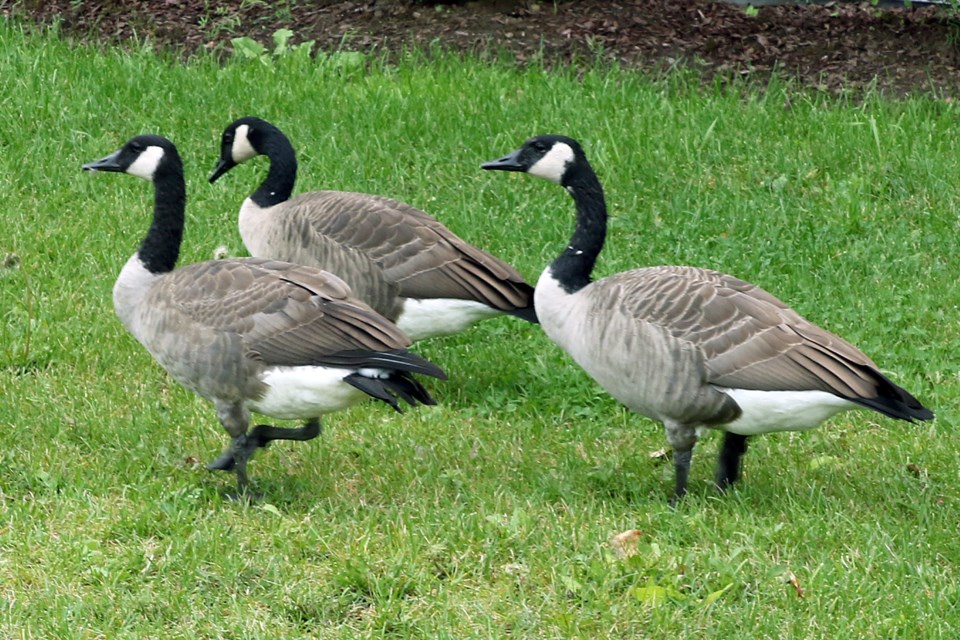Feeding the birds may be a pleasant pastime on a warm summer day, but when it comes to nuisance species such as Canada geese, heed this advice: Please do not feed the geese.
It's a message about which a NewmarketToday reader urged this publication to help raise awareness after watching vistors to Upper Canada Mall "throw bread" at the many geese who gather in the stormwater pond there on Yonge Street.
In recent years, the Town of Newmarket, in partnership with the Lake Simcoe Region Conservation Authority, has planted shrubs and plants along the edge of the dam at Fairy Lake to deter geese from gathering there.
This has resulted in decreased numbers of geese that the environmental group says have caused problems for people and pets that like to stroll along the trail by the water.
Messy goose droppings, aggressive behaviour toward people with food, and foul smells are all cited as reasons to not encourage the large birds from getting comfortable in Newmarket’s waterways and ponds.
But perhaps more importantly, feeding the geese bread, crackers, popcorn and other high-carb foods such as French fries provides them little nutrition.
Geese are herbivores, and feed almost exclusively on plants, according to Environment Canada’s Canadian Wildlife Service.
“In natural areas, their foods include grass and other tender plants, seeds and berries, as well as aquatic vegetation,” the service states in a handbook on geese management and population control. “In agricultural areas, they eat grasses, cultivated grains and some vegetable crops.”
“...Because taller, older grasses are coarser and offer less nutritional value, geese prefer new grass shoots, which explains their preference for mowed lawns.”
Prevention is the best method to geese control and that includes no feeding.
“Supplemental feeding encourages a high concentration of geese year-round. Geese will not abandon a site as long as people feed them,” the handbook states. “However, when the diets of geese are not supplemented with handouts and they have to depend on the more limited natural food supply, some or all will move elsewhere.”
Here are some reasons why you should not feed geese, courtesy of the geese management firm Geese Relief:
- Bread, for example, is like junk food. The high-carb staple provides little nutritional content, and birds that fill up on that will not seek out other nutritious food. This can cause the birds to become malnourished, which can contribute to a host of health problems for both adults and babies.
- Even though you may only choose to feed geese and other birds small amounts of bread or other foods, other families may be doing the same thing. The result could be that the birds' diet consists primarily of unhealthy foods.
- If an abundant supply of food is readily available from humans, the geese population will grow because the birds will be attracted to the handouts. This can cause the area to become overcrowded. A supply of easy-to-acquire food will also lead the birds to lay more eggs, which can further contribute to overpopulation.
- Feeding geese bread can also contribute to the spread of disease. A diet rich in carbohydrates will cause the birds to defecate more, which can spread bacteria that can contribute to disease. Moldy bread that is not eaten and left on the ground can cause aspergillosis, a lung infection that can be fatal to waterfowl. In addition, rotting bread can attract pests, such as rats, mice, and insects, which can spread disease.
- Feeding geese can also pollute the environment. Uneaten bread is unsightly. It can rot and release noxious odors, and it can also lead to the growth of algae, which can clog natural waterways and endanger the health of fish and other wildlife.
- Geese and other birds that rely on humans for food lose their natural fear and may place themselves in dangerous situations, such as crossing roads in search of food. They may also become aggressive toward humans who do not provide them with the food they want.
- While you may think that you are helping geese by providing them with food, you can be jeopardizing the health of the birds, other animals, and humans, as well as polluting the environment. Wild geese have plenty of healthy food in their habitat to sustain them. Let the geese find food on their own so that they and other animals in the environment can stay healthy.



